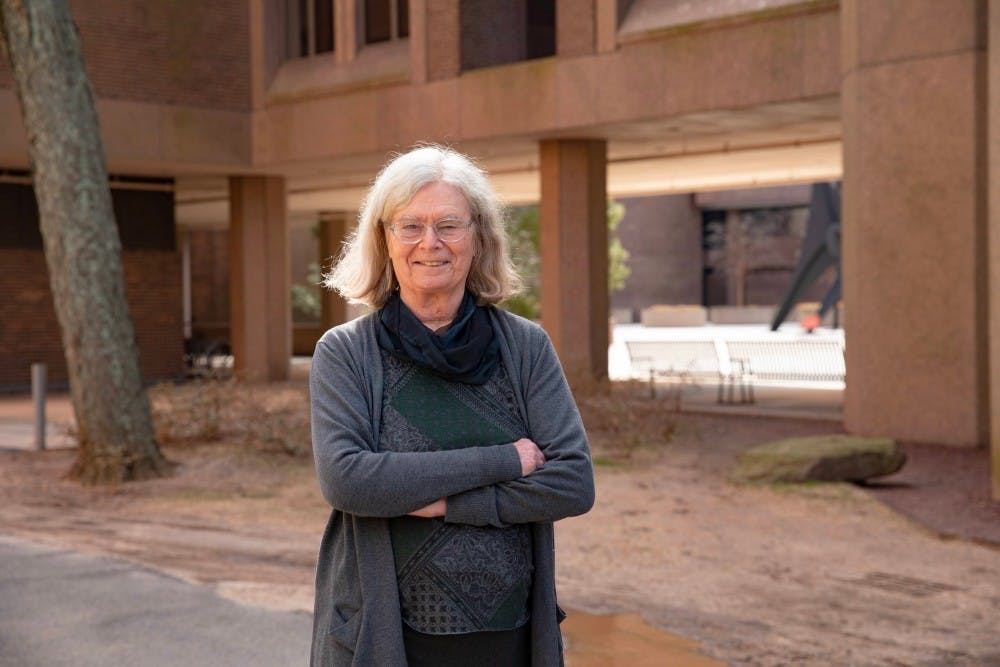The Norwegian Academy of Science and Letters announced on March 19, 2019, that it has awarded the 2019 Abel Prize to University-affiliated mathematician Karen Keskulla Uhlenbeck. She is the first woman to receive the prize.
Currently Professor of Mathematics, Emerita, and Sid W. Richardson Regents Chair at the University of Texas at Austin, Uhlenbeck is a visiting senior research scholar at the University’s Department of Mathematics and a Visitor at the Institute for Advanced Study, where she has held multiple positions in the past.
The Abel Prize was awarded to Uhlenbeck “for her pioneering achievements in geometric partial differential equations, gauge theory and integrable systems, and for the fundamental impact of her work on analysis, geometry and mathematical physics.”
Modeled after the Nobel Prize, for which mathematics is not a category, the Abel Prize was first awarded in 2003. The Abel Prize is named for Norwegian mathematician Niels Henrik Abel, and it “recognizes contributions to the field of mathematics that are of extraordinary depth and influence.” The prize is accompanied by six million Norwegian kroner, which is equivalent to approximately $704,000.
Uhlenbeck became the second woman, after Emmy Noether, to give a Plenary Lecture at the International Congress of Mathematicians in Kyoto, Japan, in 1990. Uhlenbeck also helped found the Park City Mathematics Institute at the IAS, a summer program which congregates mathematicians, mathematics teachers, and students to facilitate educational and scholarly immersion.
Uhlenbeck is a co-founder of the IAS Women in Mathematics Program, which seeks to address gender imbalance in the mathematics field and to strengthen success among female mathematicians.
Born in Cleveland, Ohio, in August of 1942, Uhlenbeck graduated from the University of Michigan with a B.S. in mathematics in 1964. She then pursued graduate studies at Brandeis University, where she received a M.A. in 1966, followed by her Ph.D. in 1968, under the guidance of Richard Palais. Having held academic appointments at institutions such as the University of Chicago, University of California at Berkeley, and the Massachusetts Institute of Technology, Uhlenbeck is the recipient of numerous other accolades, including a MacArthur ‘Genius Grant’ Fellowship in 1983.
“The fact that she is the first woman to win this prize is perhaps very encouraging to young women who are entering the field of mathematics; it’s important to have role models,” said David Gabai, the Hughes-Rogers Professor of Mathematics and the Chair of the Mathematics Department. “Professor Uhlenbeck has had a long track record of mentoring not only women, but all levels of students: undergraduate students, graduate students, even teachers.”

Uhlenbeck’s contributions over a long career spans a wide range of fields, from topology to geometry to theoretical physics. Uhlenbeck is a pioneer in the field of geometric analysis, which draws insights from both differential equations, geometry, and topology to make new discoveries. Some of Uhlenbeck’s work deals with minimal surfaces and solves the shape of soap films in high-dimensional spaces.
Sun-Yung Alice Chang, the Eugene Higgins Professor of Mathematics at the University and a member of the five-person prize committee that determined the recipient of the 2019 prize, remarked on the importance of Uhlenbeck’s contributions.
“She works across and connects research in different fields and did a number of pioneer works in the gauge theory, her work laid the analytic foundation for future study of the subject which nowadays still is an active area of research,” Chang said.
Edward Witten, a mathematical physicist and 1990 Fields Medalist who serves as the Charles Simonyi Professor in the School of Natural Sciences at the Institute for Advanced Study, explained the relevance of Uhlenbeck’s work in the discipline of theoretical physics.

Witten noted Uhlenbeck’s contributions to the study of non-abelian gauge theory, or Yang-Mills theory, which he stated is the “framework for understanding elementary particles.”
“Very little was understood about the Yang-Mills equations from a mathematical point of view,” said Witten. “Karen Uhlenbeck was one of the pioneers in establishing a mathematical understanding of these equations.”
Yang-Mills theory is necessary for unifying two fundamental forces, the electromagnetic force and the weak force, and for understanding the strong force. Thus, the theory is fundamental to the current Standard Model in particle physics.
“For physicists, Uhlenbeck's work pinpointed the uniqueness of the small instanton singularity,” Witten explained. “Study of the small instanton singularity in string theory led to many important results in the 1990s.”
Uhlenbeck is the seventh Abel Prize laureate to be associated with the University. Previous laureates associated with the University include former Associate Professor of Mathematics at the University Robert P. Langlands, who won the 2018 prize; Andrew Wiles, the James S. McDonnell Distinguished University Professor of Mathematics, Emeritus, who claimed the 2016 prize; the late University mathematician and Nobel laureate John F. Nash, who shared the 2015 prize with Louis Nirenberg; Professor of Mathematics Yakov Sinai, who won the 2014 prize; University alumnus and former mathematics faculty member John W. Milnor ’51 GS ’54, the 2011 prize recipient; and John Tate GS ’50, who received the 2010 prize.
On May 21, Uhlenbeck will accept the Abel Prize from His Majesty King Harald V of Norway in a ceremony at the University Aula in Oslo, Norway.








